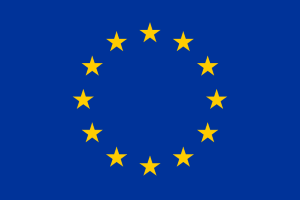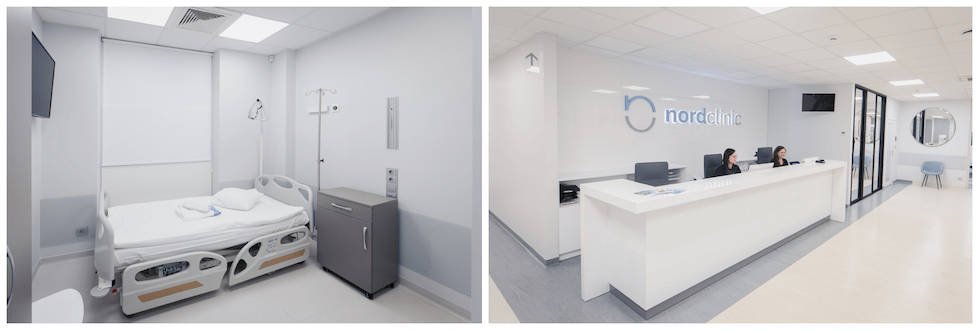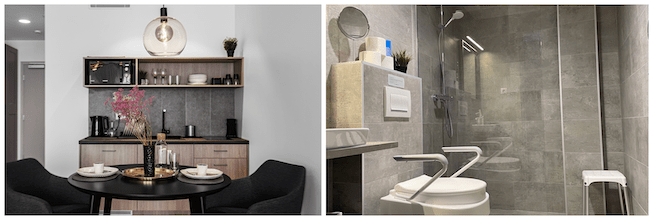Thyroid Gland Surgery
Leading medical tourism clinic
We are the leading medical tourism clinic in the Baltic region with over 10 years of experience. We are proud of the fact that around 90% of our patients come from abroad: the UK, Ireland and Scandinavian countries – this is the area we specialise in and our processes have been adapted to cater specifically for patients from abroad. Our team of surgeons perform over 4.000 surgeries per year, mostly plastic, bariatric, orthopaedic, general and gynecological surgeries.
Reviews and Facebook group
Our patients and surgeons in the media
Prices
- Thyroid gland surgery (thyroidectomy) – from 3.100 £ | or 1.600 £ with S2 funding*
*Your surgery can be partly funded via the S2 funding route (read more in the next tab)
- accommodation with medical care – from 62 £ per night
The S2 route may entitle you to NHS funding for planned state healthcare treatment in Lithuania. You can save up to 80% for the hernia surgery. Contact our customer service for more information:
- Thyroid gland surgery (thyroidectomy):
- from 3.100 £ without S2 funding
- from 1.600 £ with S2 funding
Get your surgery for free by claiming a refund from your local health board. We cooperate with HSE and other health boards across the EU to help our Irish and EU patients receive a refund for their surgery in Lithuania. The clinic helps with the documents needed to claim a refund after following the EU directive route for medical treatment abroad.
Regular price:
- consultation with the surgeon and anaesthesiologist
- all the necessary health tests before and after the surgery
- surgery
- anaesthesia
- hospital stay (1-3 days) with 24 hours medical care
- 24/7 personal assistance during your stay
- transfers to / from the airport, hotel and clinic
Please note that the price of the surgery itself is provisional and may be accurately assessed only after the evaluation of each individual case.
The default currency at our clinic is EUR, so if you were looking at prices in GBP it may vary depending on GBP / EUR exchange rate at the moment of payment.
- Thyroid gland surgery (thyroidectomy) – from 3.700 € | or 1.900 € with S2 funding*
- accommodation with medical care – from 74 € per night
The S2 route may entitle you to NHS funding for planned state healthcare treatment in Lithuania. You can save up to 80% for the hernia surgery. Contact our customer service for more information:
- Thyroid gland surgery:
- from 3.700 € without S2 funding
- from 1.900 € with S2 funding
Get your surgery for free by claiming a refund from your local health board. We cooperate with HSE and other health boards across the EU to help our Irish and EU patients receive a refund for their surgery in Lithuania. The clinic helps with the documents needed to claim a refund after following the EU directive route for medical treatment abroad.
Regular price:
- consultation with the surgeon and anaesthesiologist
- all the necessary health tests before and after the surgery
- surgery
- anaesthesia
- hospital stay (1-3 days) with 24 hours medical care
- 24/7 personal assistance during your stay
- transfers to / from the airport, hotel and clinic
Please note that the price of the surgery itself is provisional and may be accurately assessed only after the evaluation of each individual case.
The default currency at our clinic is EUR, so if you were looking at prices in GBP it may vary depending on GBP / EUR exchange rate at the moment of payment.
Patient stories

Get your surgery for free by claiming a refund from your local health board. The clinic helps patients with the documents needed to claim a refund after following the EU directive route for medical treatment abroad. It applies to patients who are insured under the systems of one of the EU countries and may not get the surgery due to long waiting times. On average our patients from the EU countries get fully refunded by their local health board in 3-5 months after their surgeries.
Our surgeon
- Our surgeon Albertas Dauksa has over 20 years’ of experience
- Performs about 350 operations per year
- Has already performed over 2.000 thyroid operations
- Also performs transplants, multi-organ operations, pancreas liver, stomach resections
- Member of European Digestive Surgery (EDS)
- Author of more than 75 publications
11 reasons that make us the most popular bariatric clinic abroad
Our team of 3 bariatric surgeons has 15-20 years of experience in the field in total performing over 500 different bariatric surgeries per year. Moreover, our surgeons are members of various prestigious surgical societies both Lithuanian and international. Our leading bariatric surgeon Dr Almantas Maleckas has performed more than 7.000 bariatric surgeries. He is fluent in four languages, among which English and Swedish. The surgeon has been regularly working in Sweden for over 15 years. Dr Maleckas is a pioneer of laparoscopic surgery in Eastern Europe and has trained many other bariatric surgeons in the region.
We are one of the leading bariatric surgery clinics for medical tourists in the European Union. We are proud of the fact that over 90 % of our patients come from the UK, Ireland, Norway, Sweden, Denmark, Germany, Switzerland and other countries.
We are trusted by our patients and we appreciate all the reviews and feedback collected over the years. Find testimonials here or on Google.
Already more than 5.000 of our former, current and future patients joined our online community with the aim to build a space for opinions and mutual support. Members are welcome to share experiences about their visit to the clinic and to discuss all surgery-related matters.
We offer a 5-year follow-up which includes being able to get in touch with our Lithuanian dietitian Karolina. She is consulting patients after surgery and is available upon request to answer postoperative nutritional questions for five years after surgery.
Our clinic is the only clinic that has developed its own app designed specifically for bariatric patients – Bariatric IQ. The most useful feature of this app is special bariatric diet recommendations based on a particular product, a patient’s gender, time after surgery and other factors. Such a feature has not been replicated by any other bariatric apps in the world. Read more and download the app on your IOS or Android smartphone here.
Our clinic works according to the highest standards set by the European Union. This helps to guarantee the quality of medical services. We care about the safety, comfort and successful results of our patients from all over the world.
The clinic helps patients with the documents needed to claim a refund after following the EU directive route for medical treatment abroad. It applies to patients who are insured under the systems of one of the EU countries and may not get the surgery due to long waiting times.
We provide customer service in 9 foreign languages including English, Swedish, Norwegian, Danish, Italian, Spanish, French, Russian, Polish. Everyone in our clinic speaks English, including nurses, assistants and the surgeon.
Combining different plastic surgery procedures to offer optimal treatment for post-bariatric patients has been our plastic surgery department’s specialisation for many years now. We have performed such surgeries for more than 10.000 patients to this date. Since weight loss patients often require multiple surgical procedures to address excess skin, surgery planning and surgeons’ experience are very important. We carefully select patients, evaluate each case individually, and only agree to combine surgeries within health & safety limits. Our team of 9 plastic surgeons performs more than 3.000 plastic operations a year, a number that no other clinic in Central & Eastern Europe can match.
Direct flights to Lithuania







Our clinic

Self-catered accommodation with medical care
What is thyroid gland? What are its functions?
The thyroid gland is a butterfly-shaped organ that is located in the neck. It is a part of the endocrine system and it secretes two essential hormones, primarily thyroxine (T4) and triiodothyronine (T3). They regulate the body’s physiological functions, like metabolism, digestion, heart rate, muscle work, and bone health. The thyroid gland also controls calcium levels in the blood by producing calcitonin. All in all, the thyroid gland plays an integral part in maintaining a healthy metabolism, development, growth, and proper functioning of many other organ systems in the body.
Who is a proper candidate for thyroid surgery?
Some of the thyroid problems that may require surgical treatment:
- Suspicious Thyroid nodules. Some thyroid nodules can’t be identified as cancerous or noncancerous after testing a sample from a needle biopsy. If nodules are at increased risk of being cancerous, thyroid surgery may be required.
- Hyperthyroidism is a condition where the thyroid produces too much thyroid hormone. Surgery is recommended in some cases to remove a part or a whole thyroid.
- Graves’ disease is an autoimmune condition that presents with elevated levels of thyroid hormones. A total or subtotal thyroidectomy may be required to set the balance back.
- Thyroid cancer is primarily treated with surgery because it is necessary to excise the tumour or the entire gland and stop cancerous growth.
- Goiter is a condition where the thyroid gets enlarged due to iodine deficiency. Surgery removes the enlarged gland if it becomes too big and starts putting pressure on other organs, causing swallowing or breathing difficulties.
When is the surgery necessary? What can be alternative options?
Surgery is necessary when there is an enlarged thyroid that causes compression symptoms like difficulty breathing or swallowing. Alternative treatment methods depend on the particular condition. For example, if the patient has hyperactive thyroid they are offered anti-thyroid medication and radioactive iodine therapy. Patients are usually monitored and only operated on if the gland becomes too large.
How to prepare for thyroid surgery?
Preparing for thyroid surgery involves several steps and careful planning. Firstly, patients should have an initial consultation with the doctor, during which their medical history and current health status are evaluated.
The doctor usually asks to perform hormone tests to determine the levels of thyroid hormones as well as do an ultrasound check to inspect the thyroid before surgery.
Patients should stop taking certain medications, like blood thinners and aspirin, and inform the doctor of any medication or supplements they are currently taking.
Before surgery, patients must undergo preoperative tests, like blood tests to check thyroid hormones, a complete blood count (CBC), liver and kidney function tests, and urinalysis. Imaging tests are required to evaluate the size and location of the thyroid gland, and its changes. Fine-needle aspiration biopsy may be performed to determine if the nodules are suspicious, cancerous or benign. Patients also need an electrocardiogram (ECG), a chest x-ray, and others, if required.
Patients must fast 8 hours before surgery, meaning that it is prohibited to eat anything to lower the surgical risk and prevent regurgitation.
How is thyroid surgery performed?
Thyroid surgery is performed under general anaesthesia, meaning that the patient is asleep during the operation. The surgeon makes an incision in front of the neck, usually along a natural skin crease to minimize scarring. The length of the incision depends on the size of the thyroid gland. Once the incision is made, the surgeon carefully separates the thyroid gland from the surrounding tissues. The surgeon may remove only a part of the thyroid gland (lobectomy) or the entire gland (total thyroidectomy). After the thyroid gland or a part of it is removed, the surgeon checks for any bleeding and ensures that parathyroid glands, which regulate calcium levels in the body, are intact. Then, the surgeon closes the incision with sutures and applies a dressing to the site.
Recovery after thyroid surgery. Will I have pain after the operation? Will I have a scar?
After thyroid surgery, patients may experience some pain at the incision site which is managed with pain medications, rarely narcotic pain medication will be required. An overnight stay in the clinic is a must for observation and assistance. Upon discharge, patients are advised on wound care, medications, and follow-up appointments.
Recovery time varies from person to person. Generally, most patients experience some pain, discomfort, and swelling around the incision site in the neck. Most patients can return to everyday activities within 2 weeks, although it may take up to 4 weeks to fully recover. During this time, patients should avoid strenuous exercise and bending at the waist. The size and location of the scar depend on the extent of the surgery. Some patients may be more prone to scarring, especially if they have a history of keloid scars.
Possible complications
Thyroid surgery is generally considered safe, however, like any other intervention, it carries a risk of complications.
May include bleeding, infection, and seromas (fluid collections underneath the skin at an incision site).
There is possible damage to the nearby, closely related structures, like the recurrent laryngeal nerve that controls your voice. The injury of the recurrent laryngeal nerve occurs permanently in about 0.5-1% of patients. However, it is not uncommon to experience some temporary hoarseness after surgery.
Thyroid storm (when too many thyroid hormones are released into the bloodstream during surgery) and low blood calcium levels may occur after thyroid surgery because the parathyroid glands may not function normally right after surgery and temporary hypocalcemia/hypoparathyroidism is common.
Finally, patients should discuss the potential individual risks with their doctor and carefully follow pre-operative and post-operative care instructions to minimize the risk of complications in all three categories.
Send us your enquiry







